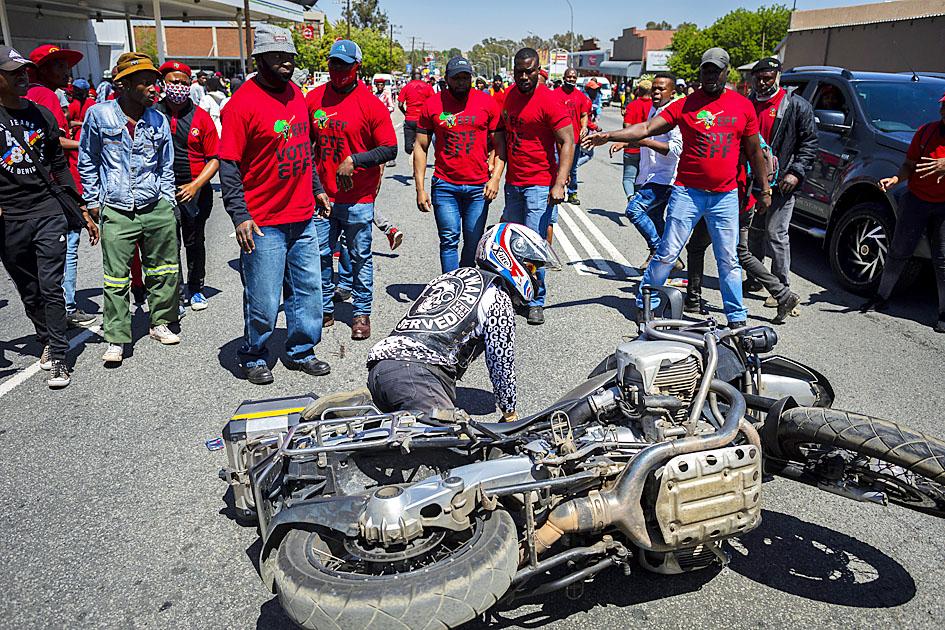White South African farmers and rival black protesters yesterday demonstrated in the central town of Senekal over a murder case that has reignited racial tensions still simmering 26 years after the end of apartheid.
The killing of Brendan Horner, a white man whose body was found tied to a pole at his farm in Free State Province, sparked riots at the start of this month, which prompted South African President Cyril Ramaphosa to make a statement urging South Africans to “resist attempts... to mobilize communities along racial lines.”
The farmers, who accuse the government of failing to protect them from violent crime, started arriving in pickup trucks ahead of a court hearing in Senekal for Horner’s two suspected killers. The farmers mostly wore khaki shirts and shorts, and a few wore military outfits.

Photo: EPA-EFE
“We are getting tired now of all the farm murders,” said Geoffrey Marais, 30, a livestock trader from Delmas, where a woman was strangled to death two weeks ago.
“Enough is enough. [The government] must start to prioritize these crimes,” he said.
The radical Economic Freedom Fighters (EFF), who represent poor black South Africans who feel left out of the country’s post-apartheid prosperity, staged a counter-march attended by thousands of protesters.
They work the group’s trademark red shirts and berets in the town center.
Police separated the two groups with razor wire in one street, but they regrouped and faced off in another area as police helicopters hovered overhead.
Despite the tensions, there were no reports of violence.
The EFF blames South Africa’s problems on what it says is a continued stranglehold of the economy by whites.
Several buses full of EFF supporters drove past the farmers singing “kill the boer [farmer]” out of the window as they headed into town.
“We are not scared of them. We are going to get them on Friday. We are going to face white men face to face,” the EFF’s firebrand leader Julius Malema was quoted as saying in the local press this week.
“I’m here because of white people... taking advantage of us,” said EFF supporter Khaya Langile, who came from the Johannesburg township of Soweto.
Tensions have been heightened by a government plan to expropriate white-owned land without compensation as part of an effort to redress economic inequalities that remain stark a quarter of a century after the end of apartheid.
About 70 percent of privately owned farmland in South Africa is owned by whites, who make up less than 9 percent of the country’s population of 58 million.

A fire caused by a burst gas pipe yesterday spread to several homes and sent a fireball soaring into the sky outside Malaysia’s largest city, injuring more than 100 people. The towering inferno near a gas station in Putra Heights outside Kuala Lumpur was visible for kilometers and lasted for several hours. It happened during a public holiday as Muslims, who are the majority in Malaysia, celebrate the second day of Eid al-Fitr. National oil company Petronas said the fire started at one of its gas pipelines at 8:10am and the affected pipeline was later isolated. Disaster management officials said shutting the

US Vice President J.D. Vance on Friday accused Denmark of not having done enough to protect Greenland, when he visited the strategically placed and resource-rich Danish territory coveted by US President Donald Trump. Vance made his comment during a trip to the Pituffik Space Base in northwestern Greenland, a visit viewed by Copenhagen and Nuuk as a provocation. “Our message to Denmark is very simple: You have not done a good job by the people of Greenland,” Vance told a news conference. “You have under-invested in the people of Greenland, and you have under-invested in the security architecture of this

UNREST: The authorities in Turkey arrested 13 Turkish journalists in five days, deported a BBC correspondent and on Thursday arrested a reporter from Sweden Waving flags and chanting slogans, many hundreds of thousands of anti-government demonstrators on Saturday rallied in Istanbul, Turkey, in defence of democracy after the arrest of Istanbul Mayor Ekrem Imamoglu which sparked Turkey’s worst street unrest in more than a decade. Under a cloudless blue sky, vast crowds gathered in Maltepe on the Asian side of Turkey’s biggest city on the eve of the Eid al-Fitr celebration which started yesterday, marking the end of Ramadan. Ozgur Ozel, chairman of the main opposition Republican People’s Party (CHP), which organized the rally, said there were 2.2 million people in the crowd, but

JOINT EFFORTS: The three countries have been strengthening an alliance and pressing efforts to bolster deterrence against Beijing’s assertiveness in the South China Sea The US, Japan and the Philippines on Friday staged joint naval drills to boost crisis readiness off a disputed South China Sea shoal as a Chinese military ship kept watch from a distance. The Chinese frigate attempted to get closer to the waters, where the warships and aircraft from the three allied countries were undertaking maneuvers off the Scarborough Shoal — also known as Huangyan Island (黃岩島) and claimed by Taiwan and China — in an unsettling moment but it was warned by a Philippine frigate by radio and kept away. “There was a time when they attempted to maneuver